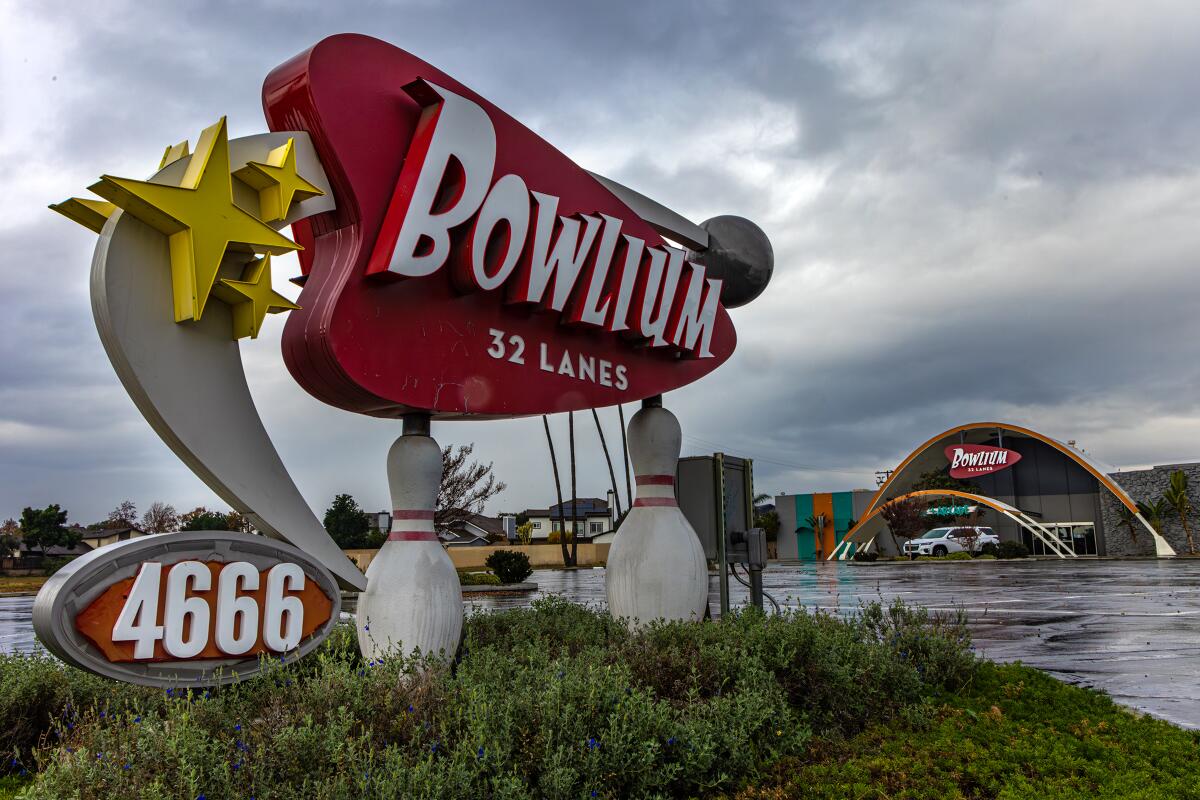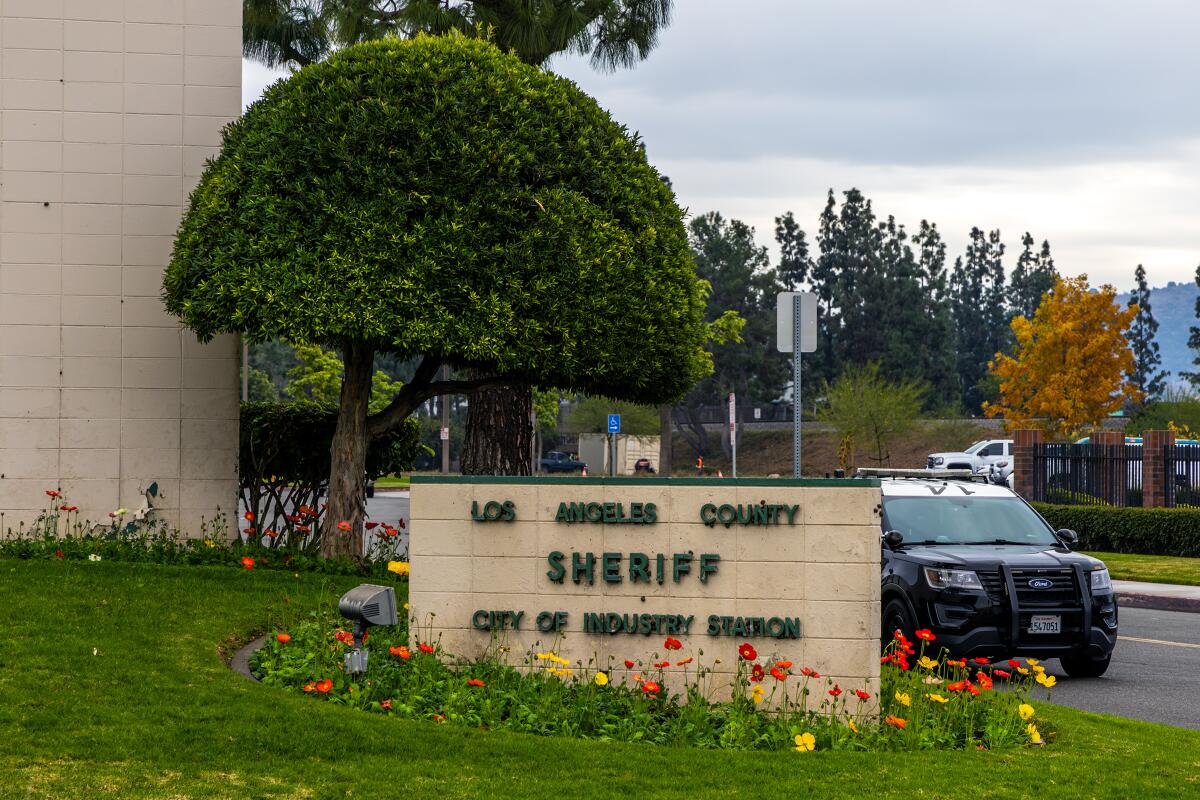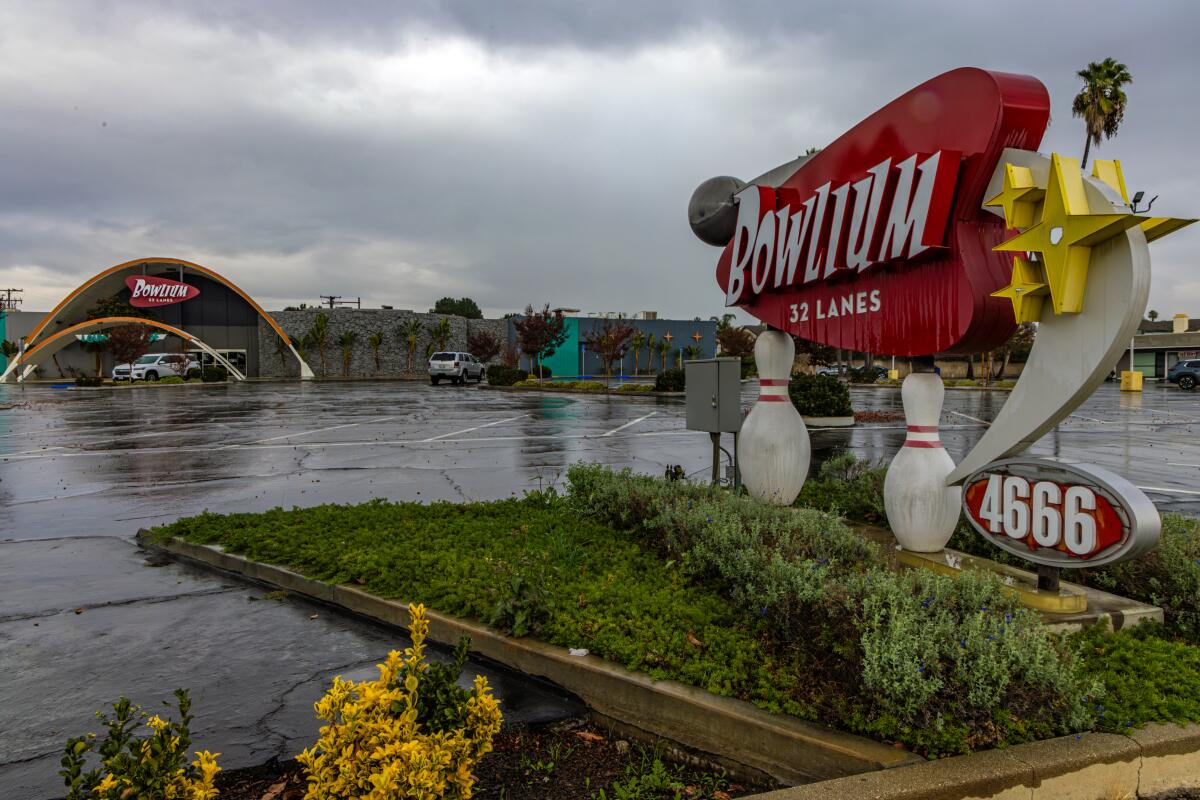A bowling alley, a boozy fight and allegations of a new deputy gang in Los Angeles

- Share via
On a cool February night two years ago, a group of Los Angeles County sheriff’s deputies met up at a Montclair bowling alley, drinking to celebrate the promotion of a new sergeant in their ranks.
At the end of the evening, the party took a turn. The off-duty deputies picked a fight with a group of teenagers in the parking lot, according to two law enforcement sources and a police report reviewed by The Times. A sergeant started it when he pushed open a car door as he walked past, the report says.
Shouting erupted, and one of the deputies allegedly flashed a handgun, according to the report. Some of the others started mocking the teens and shouting obscenities. And before they dispersed, police records show, one deputy punched a 19-year-old in the face.
But once the Sheriff’s Department got wind of what happened and started investigating, other troubling details emerged. Two of the men in the group — one deputy and one sergeant — admitted to investigators that they had tattoos officials linked to a deputy gang: the Industry Indians, based out of the City of Industry sheriff’s station, according to a law enforcement source.

“We were shocked by the alleged behavior by our employees involved in that incident,” Sheriff Robert Luna told The Times in a recent interview. “Our investigators did a pretty decent job of at least identifying not only the misconduct that occurred — that in my opinion was outrageous — but then getting to a point where some of these individuals were identified to have like tattoos.”
The existence of the Industry Indians has not previously been made public, and it’s not clear how long the group has existed. Luna said the Bowlium investigation was the first he’d heard of it. A law enforcement source with knowledge of the case said investigators believe there are dozens of members.
Both of the tattooed deputies were fired. Two other deputies who were at the bowling alley that night — but denied having tattoos — were also fired in connection with the incident, and several others were given lesser disciplinary sentences. Two of the deputies could not be reached for comment. The other two declined to comment through their lawyer.
For decades, the Sheriff’s Department has been roiled by allegations that secretive groups of deputies with matching tattoos have been linked to violence and corruption. It’s rare for the Sheriff’s Department to punish deputies for alleged gang involvement. Department officials would not answer questions about whether similar firings had ever happened before the Bowlium case.
Last year, the Civilian Oversight Commission released a 70-page report condemning the “cancer” of deputy gangs, saying they “create rituals that valorize violence, such as recording all deputy-involved shootings in an official book, celebrating with ‘shooting parties,’ and authorizing deputies who have shot a community member to add embellishments to their common gang tattoos.”
A 2021 Loyola Law School report identified 18 such groups, known by names like the Grim Reapers, the Banditos and the Executioners. Now, revelations about the Industry Indians show there may be more.
“We have yet to understand how many deputy gangs there are in the department,” said Sean Kennedy, who chairs the Civilian Oversight Commission and is one of the authors behind the 2021 report. “But I feel confident saying there are many more that we have not yet discovered.”
The deputies involved in the standoff outside the Bowlium bowling alley had all — at some point — worked at the Industry station. The deputy whose promotion they gathered to celebrate had worked there too, but was transferring to a different station, according to the law enforcement sources.
The men drank and bowled until the 11 p.m. closing time, then walked out to their cars together. One deputy peeled off from the others and got into his Mercedes.
According to a law enforcement source and a partially redacted Montclair police report, when the remaining deputies walked past the trunk of a silver Nissan sitting in the parking lot, a sergeant at the back of the group pushed open the rear passenger door just as one of the teens inside was trying to close it.
The deputies kept walking. But, apparently angered, another teen jumped out of the car shouting. Surveillance video captured the sergeant at the back of the group as he turned his cap backward and skipped “quickly toward” the Nissan, according to the Montclair police report. He appeared “eager to confront” the teens, a Montclair investigator wrote.
The other deputies heard the commotion and turned around. Some began mocking the teens with crying sounds, witnesses told police. According to the police report, others shouted homophobic slurs or obscenities, and one allegedly hurled a challenge: “What are you going to do about it?”

At some point, several deputies later told police, the teens either mentioned a gun or made a threat to “blast” them — though the police report shows no indication that the teens had any weapons with them that night.
But a witness sitting in a car a few spots away told police that she saw another man in the group walk toward the teens’ car and pull up his green flannel shirt, flashing the handle of a black handgun, according to the police report.
As the dispute intensified, the other deputies gathered around the Nissan, and the deputy who had peeled off from the others minutes earlier drove up in his Mercedes. He hopped out of the car and punched the shouting teen in the face, according to the report. At one point, the sergeant allegedly grabbed the open back door on the passenger side and started swinging it “back and forth violently” about six times, “shaking the entire vehicle,” according to the police report. Once the tension dissipated, everyone went home.
None of the deputies told their supervisors what happened, the two sources said. Two days later, a witness reported the incident to the Montclair Police Department, which patrols the small city in southwestern San Bernardino County across the Los Angeles County line from Claremont.
Once police picked up the case, they went to the Sheriff’s Department for help figuring out who was in the parking lot that night. When a Montclair investigator called the deputies for questioning, several refused to talk or gave misleading answers.
That March, police sent the case to local prosecutors, requesting that they consider filing a misdemeanor battery charge against one deputy and a misdemeanor charge against another for brandishing a gun.
Ultimately, the San Bernardino County District Attorney’s Office decided not to pursue either case. A spokeswoman for the office told The Times last month that there was “insufficient evidence to prove guilt beyond a reasonable doubt.”
But the Sheriff’s Department — which had only learned of the incident from Montclair police — still moved forward with an administrative investigation.
When sheriff’s investigators interviewed the deputies, one denied flashing his gun and gave conflicting statements about whether he even had it with him that night, the source said. The deputy then told investigators he had a tattoo on his left ankle, but said he didn’t know the name of the person who originally invited him to get it and that it was not associated with a gang, according to the source. Instead, he said he saw it as a recognition of his good work ethic.
The source said that when Sheriff’s Department investigators interviewed the sergeant who pushed open the car door, he admitted having an “Industry Indians” tattoo, gave investigators the name of the deputy who invited him to get it and recounted going to an inking party to celebrate.
He said the image resembled the character from Shock Top beer labels, a cartoon face in profile with sunglasses and a mohawk, and that it was something he earned through hard work and compassion. According to the source, he also told investigators his tattoo included the Roman numeral 58 to indicate he was the 58th deputy inked with that image.
The Sheriff’s Department faulted him for failing to cooperate with Montclair police, according to an online report. One of the Montclair police officers who investigated the case wrote that the sergeant denied pushing the door open. When the two men spoke on the phone, the police officer “attempted several times” to explain that he was watching the Bowlium’s surveillance video as they talked and “could clearly see him pushing the door open.”
According to the Montclair report, the sergeant also told police that he didn’t see anyone punch the teens — even though the report says surveillance video showed him standing nearby at the time.
Late last year, county disciplinary records show, two deputies and two sergeants were fired. One of them was the newly promoted sergeant, who was allegedly uncooperative and dishonest with Montclair police, initially telling them nothing happened that night.
All of the fired deputies have appealed their punishments to the county’s Civil Service Commission, according to a county source familiar with the situation who was not authorized to speak publicly. Last month Luna pointed to that possibility of appeal as the reason he couldn’t give more details about the case or how the department plans to investigate the group.
“We’re being very cautious,” Luna said. “We’re looking at the bigger picture and figuring out as we move forward: What is the best thing to do so we eradicate this problem?”
As of now, it’s not clear how big the problem is: Officials have not said how many people are believed to be part of the Industry Indians, how long the group has been around or whether its members have been involved in other confrontations or acts of violence. The Sheriff’s Department has not yet provided any information in response to a series of public records requests filed last month.
Since the early 1990s, at least half a dozen government-appointed commissions and outside organizations have investigated the problem of deputy gangs, including the U.S. Commission on Civil Rights, the Citizens’ Commission on Jail Violence, Loyola Law School and — most recently — the Civilian Oversight Commission.
Based in part on sworn testimony during a series of public hearings, the oversight commission’s 2023 report described what is known about gangs connected with several stations, including South L.A., Century, Lancaster, Compton and East L.A.
At some stations, inked deputies allegedly threatened “work slowdowns” where gang members would slack off on their duties if they didn’t get their way, according to the report. At other stations, deputies described a climate of fear, telling the oversight commission they worried about retaliation if they reported gang members’ misconduct.
At the Compton station, some witnesses recounted being ridiculed and discriminated against by members of a gang known as the Executioners. One lieutenant testified about gang-connected deputies allegedly celebrating at a bar in Fullerton after they’d been involved in a shooting.
But the report focused heavily on the East L.A. station, home to a clique of predominantly Latino deputies who sport tattoos of a skeleton with a sombrero, bandolier and pistol and go by names such as “the Godfather” and “Bam Bam.” In recent years, the group gained notoriety for their involvement in a late-night deputy-on-deputy dispute outside the Kennedy Hall event space in 2018.
The off-duty clash led to several injuries as well as a lawsuit filed by eight deputies who alleged that a group of Banditos assaulted them. The case — in which the plaintiffs are seeking a combined $80 million — is scheduled for trial later this year.
Overall, cases involving alleged members of deputy gangs have cost the county — and taxpayers — more than $55 million in legal payouts. Though none of those cases centered on an Industry Station gang, one other case that went to trial in 2019 included a brief suggestion that such a group might exist.
In that case, a sergeant who had worked at Industry Station was asked on the witness stand whether he had ever heard of an Industry Station tattoo. The sergeant said that he knew of “two or three of them,” including one that was a skull and another that “looked like an Indian.” But he did not reveal any more information about the group after a lawyer for the county quickly objected to the line of questioning.
The case, in which a deputy alleged he’d been harassed for reporting misconduct, ended in an $8.1-million verdict that was later overturned on appeal and sent back to the lower court. It’s scheduled to go to trial again this summer.
Despite years of damning reports and costly lawsuits, it wasn’t until 2020 that the former sheriff, Alex Villanueva, created a policy prohibiting deputies from joining any group that “promotes behavior that violates the rights of employees or members of the public.”
But critics said that didn’t go far enough, and in its report last year the oversight commission recommended the department adopt a stronger policy. So far, Luna has not yet succeeded in doing that — though recently he told The Times he expects to have a new policy in place sometime this year.
The discipline doled out to the Industry Station deputies fell under the department’s old anti-gang policy. It appears to be the first time the policy has been used to terminate an employee — though officials say there are at least two more possible cases on the horizon.
They declined to provide any details about the nature of the cases, citing the need to protect pending investigations.
More to Read
Sign up for Essential California
The most important California stories and recommendations in your inbox every morning.
You may occasionally receive promotional content from the Los Angeles Times.











